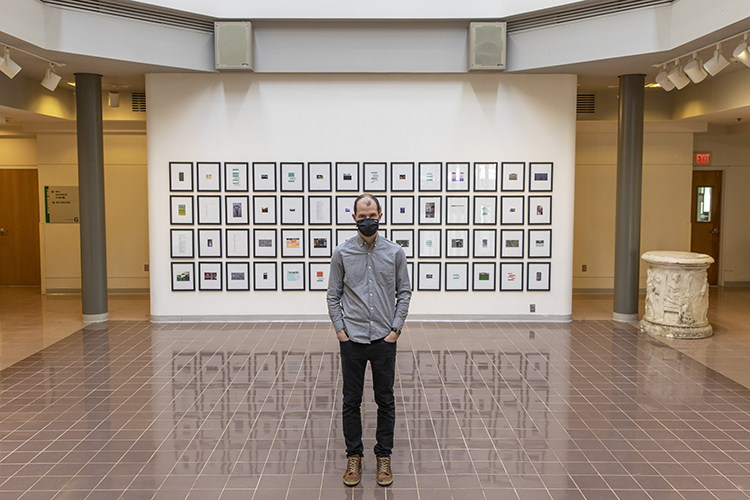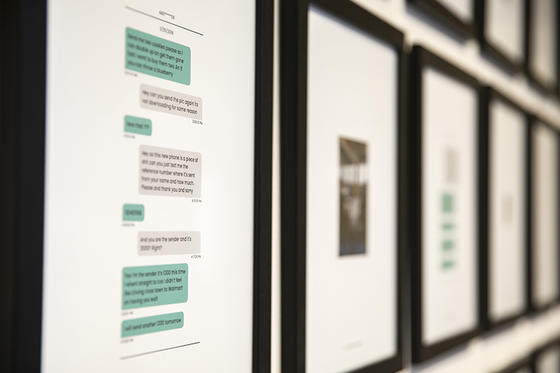Not many artists need to consult a lawyer before undertaking their latest creative project, but that's what designer Michael McDermott had to do before pulling together his first show using discarded cell phones.
One of the installations from this ongoing project, "Undeleted," is on exhibit through March 25 in the Buchanan Hall Gallery on George Mason University’s Fairfax Campus, where McDermott is an assistant professor in the School of Art.
In "Undeleted," McDermott curates content found on seven discarded cell phones. The exhibit displays two kinds of found data, intact and deleted—or what people had hoped they had deleted. He said the prints used in the exhibit show only a fraction of what he was able to extract from the phones, which held a total of 221,074 images and 30,958 texts. Since he started the project, McDermott said he has purchased about 400 phones.

"Undeleted" is a bit unusual for an art installation as it is one of five art and design projects funded in part by the Commonwealth Cyber Initiative (CCI), which is a network of industry, higher education, and economic development partners across the Commonwealth of Virginia focused on cybersecurity research.
McDermott said inspiration for the project came from a CCI presentation he attended given by Jim Jones of the Criminal Investigations and Network Analysis Center (CINA), a multidisciplinary academic consortium led by Mason that pursues strategies to advance criminal network analysis, forensics, and investigative processes.
"[Jones] gave a presentation about digital forensics and recovering information from cell phones," said McDermott. "He was talking about the law enforcement angle, but it gave me some ideas."
After the presentation, McDermott met with Jones and pitched his idea. Not only did Jones help with technical questions, he was also able to get McDermott access to XRY, the mobile forensics and data recovery software he uses to extract information from the phones.
But McDermott admits many of the phones didn't present much of a challenge in terms of extracting information.
"People think because the screen is broken or the battery is dead, that the phone is dead," he said. "But everything is still there, you just need a different battery."
As an example, he talks about one of the phones he bought that had been used for one week as a burner phone by a drug dealer in California. Although the phone was only used for a week, it contained a surprising amount of information about the person, including where she lived and that she was in bad relationship.
"In seven days, you're getting all this drama," he said.

While that phone is in the exhibit, viewers will have difficulty identifying it because McDermott is careful to protect people's information—even if they weren't so careful with it themselves.
Part of the reason McDermott consulted a lawyer was in case he found illicit content. He also talked to people at Mason and got waivers for things he might find.
"I purchased the phone, so I own that 'thing,'" McDermott said of the legal ramifications of the work. "[The lawyer] said ‘Before you start doing this, you need to decide what you're going do in this situation.’ Of course, I'll give it to the police."
Fortunately, he found nothing illicit aside from the aforementioned drug-dealing. "There were definitely private things you wouldn't want seen," he said.
But that is part of the reason he is glad this show is on a college campus.
"[College students] live on their phones, and they might not think about what happens when they sell the phone or just get rid of it," McDermott said.
CCI Executive Director Luiz DaSilva said he hopes the "Undeleted" exhibit helps people look at cybersecurity from a new perspective.
“The CCI Building Bridges Arts and Design Collaboration Program is intended to spark a fresh understanding of cybersecurity and show how cybersecurity is woven into our daily lives," said DaSilva. "Michael’s project shines a light on basic and very important data protection steps that we often forget to take.”
The closing reception for "Undeleted" is Thursday March 24, from 6 to 8 p.m. in Buchanan Hall.
